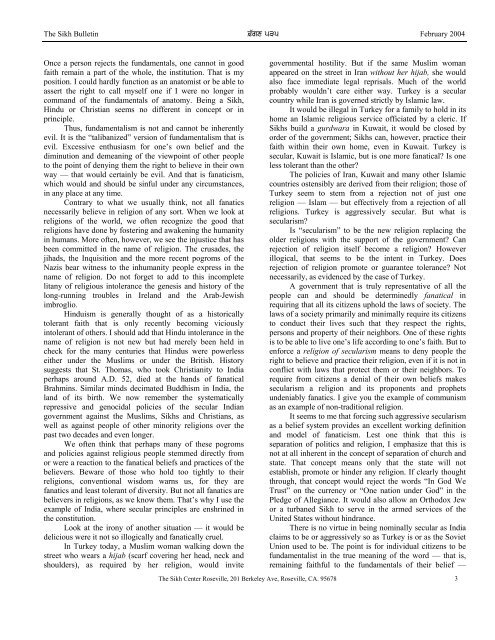You also want an ePaper? Increase the reach of your titles
YUMPU automatically turns print PDFs into web optimized ePapers that Google loves.
<strong>The</strong> <strong>Sikh</strong> <strong>Bulletin</strong> &`gx 535 February 2004<br />
Once a person rejects the fundamentals, one cannot in good<br />
faith remain a part of the whole, the institution. That is my<br />
position. I could hardly function as an anatomist or be able to<br />
assert the right to call myself one if I were no longer in<br />
command of the fundamentals of anatomy. Being a <strong>Sikh</strong>,<br />
Hindu or Christian seems no different in concept or in<br />
principle.<br />
Thus, fundamentalism is not and cannot be inherently<br />
evil. It is the “talibanized” version of fundamentalism that is<br />
evil. Excessive enthusiasm for one’s own belief and the<br />
diminution and demeaning of the viewpoint of other people<br />
to the point of denying them the right to believe in their own<br />
way — that would certainly be evil. And that is fanaticism,<br />
which would and should be sinful under any circumstances,<br />
in any place at any time.<br />
Contrary to what we usually think, not all fanatics<br />
necessarily believe in religion of any sort. When we look at<br />
religions of the world, we often recognize the good that<br />
religions have done by fostering and awakening the humanity<br />
in humans. More often, however, we see the injustice that has<br />
been committed in the name of religion. <strong>The</strong> crusades, the<br />
jihads, the Inquisition and the more recent pogroms of the<br />
Nazis bear witness to the inhumanity people express in the<br />
name of religion. Do not forget to add to this incomplete<br />
litany of religious intolerance the genesis and history of the<br />
long-running troubles in Ireland and the Arab-Jewish<br />
imbroglio.<br />
Hinduism is generally thought of as a historically<br />
tolerant faith that is only recently becoming viciously<br />
intolerant of others. I should add that Hindu intolerance in the<br />
name of religion is not new but had merely been held in<br />
check for the many centuries that Hindus were powerless<br />
either under the Muslims or under the British. History<br />
suggests that St. Thomas, who took Christianity to India<br />
perhaps around A.D. 52, died at the hands of fanatical<br />
Brahmins. Similar minds decimated Buddhism in India, the<br />
land of its birth. We now remember the systematically<br />
repressive and genocidal policies of the secular Indian<br />
government against the Muslims, <strong>Sikh</strong>s and Christians, as<br />
well as against people of other minority religions over the<br />
past two decades and even longer.<br />
We often think that perhaps many of these pogroms<br />
and policies against religious people stemmed directly from<br />
or were a reaction to the fanatical beliefs and practices of the<br />
believers. Beware of those who hold too tightly to their<br />
religions, conventional wisdom warns us, for they are<br />
fanatics and least tolerant of diversity. But not all fanatics are<br />
believers in religions, as we know them. That’s why I use the<br />
example of India, where secular principles are enshrined in<br />
the constitution.<br />
Look at the irony of another situation — it would be<br />
delicious were it not so illogically and fanatically cruel.<br />
In Turkey today, a Muslim woman walking down the<br />
street who wears a hijab (scarf covering her head, neck and<br />
shoulders), as required by her religion, would invite<br />
governmental hostility. But if the same Muslim woman<br />
appeared on the street in Iran without her hijab, she would<br />
also face immediate legal reprisals. Much of the world<br />
probably wouldn’t care either way. Turkey is a secular<br />
country while Iran is governed strictly by Islamic law.<br />
It would be illegal in Turkey for a family to hold in its<br />
home an Islamic religious service officiated by a cleric. If<br />
<strong>Sikh</strong>s build a gurdwara in Kuwait, it would be closed by<br />
order of the government; <strong>Sikh</strong>s can, however, practice their<br />
faith within their own home, even in Kuwait. Turkey is<br />
secular, Kuwait is Islamic, but is one more fanatical Is one<br />
less tolerant than the other<br />
<strong>The</strong> policies of Iran, Kuwait and many other Islamic<br />
countries ostensibly are derived from their religion; those of<br />
Turkey seem to stem from a rejection not of just one<br />
religion — Islam — but effectively from a rejection of all<br />
religions. Turkey is aggressively secular. But what is<br />
secularism<br />
Is “secularism” to be the new religion replacing the<br />
older religions with the support of the government Can<br />
rejection of religion itself become a religion However<br />
illogical, that seems to be the intent in Turkey. Does<br />
rejection of religion promote or guarantee tolerance Not<br />
necessarily, as evidenced by the case of Turkey.<br />
A government that is truly representative of all the<br />
people can and should be determinedly fanatical in<br />
requiring that all its citizens uphold the laws of society. <strong>The</strong><br />
laws of a society primarily and minimally require its citizens<br />
to conduct their lives such that they respect the rights,<br />
persons and property of their neighbors. One of these rights<br />
is to be able to live one’s life according to one’s faith. But to<br />
enforce a religion of secularism means to deny people the<br />
right to believe and practice their religion, even if it is not in<br />
conflict with laws that protect them or their neighbors. To<br />
require from citizens a denial of their own beliefs makes<br />
secularism a religion and its proponents and prophets<br />
undeniably fanatics. I give you the example of communism<br />
as an example of non-traditional religion.<br />
It seems to me that forcing such aggressive secularism<br />
as a belief system provides an excellent working definition<br />
and model of fanaticism. Lest one think that this is<br />
separation of politics and religion, I emphasize that this is<br />
not at all inherent in the concept of separation of church and<br />
state. That concept means only that the state will not<br />
establish, promote or hinder any religion. If clearly thought<br />
through, that concept would reject the words “In God We<br />
Trust” on the currency or “One nation under God” in the<br />
Pledge of Allegiance. It would also allow an Orthodox Jew<br />
or a turbaned <strong>Sikh</strong> to serve in the armed services of the<br />
United States without hindrance.<br />
<strong>The</strong>re is no virtue in being nominally secular as India<br />
claims to be or aggressively so as Turkey is or as the Soviet<br />
Union used to be. <strong>The</strong> point is for individual citizens to be<br />
fundamentalist in the true meaning of the word — that is,<br />
remaining faithful to the fundamentals of their belief —<br />
<strong>The</strong> <strong>Sikh</strong> Center Roseville, 201 Berkeley Ave, Roseville, CA. 95678 3
















